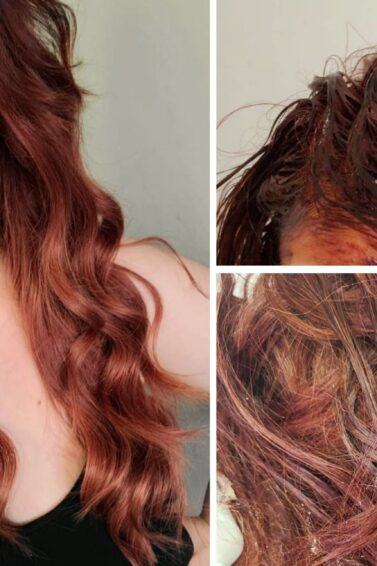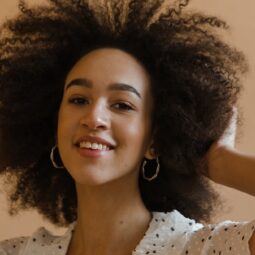
Truth or Hair: Am I Risking My Health For My Hair? Hair Dyeing Uncovered
My chemical hair treatment road map.
How often do we stop and think if there could be any risks with our beauty treatments? Because, yes—they do exist. Like anything in the beauty world, there can be a fine line between safety and risk, especially regarding some treatments and chemicals. Many of us, myself included, are aware of this. Yet, here we are—spending countless hours potentially exposing our skin or scalp to harmful components. Now, the real question is, am I risking my health for my hair, and what’s behind my motivation to ignore them?
Are Hair Treatments a Risk To My Health?

On any given week, you can find me either retouching my red color, adjusting my tape-in extensions, getting rid of frizz with keratin treatments, or, at the very least, deep conditioning my locks to try and reverse the damage I have done to my poor mane throughout the years (while throwing a lil’ prayer in there for good luck, too!). Let me tell you—it is a lot. A lot of time and money has been invested in getting my much-desired TV-commercial-worthy hair that screams “I was born with it” instead of “I just went to the hair salon to doll myself up.”
I have experienced scalp sensitivity and hair loss due to my beauty routine. Hair extensions have left me with breakage; I have felt my eyes burning due to those keratin fumes during straightening treatments. And even my hands have turned severally dry, paying the consequences after touching chemicals week after week. But I still carry on. How much real risk am I putting myself under?
“Women tend to forget all the basic measures that need to be taken when using well-known irritants. Chemicals are chemicals and each of us reacts differently to them”
Dr. Leidy Boscan
“Skin and scalp sensitivity, as secondary effects due to beauty treatments, are often overlooked,” says Dr. Leidy Boscan, MD, general surgeon and aesthetic medicine expert. “Women tend to forget all the basic measures that need to be taken when using well-known irritants such as Formaldehyde, found in straightening treatments, or Para-phenylenediamine (PPD) in hair dyes; and even certain types of acids, which are now a very popular at-home option for those who want to ‘renew’ their skin or scalp. Regardless, those are chemicals, and each of us reacts differently to them. When in doubt, and if you must DIY, do so in a ventilated area, or wear a face mask. Do a patch test if you’re coloring your hair, for example, and trust your instinct—if it stings, burns, or there’s a noticeable change in the color or texture of your scalp or skin, wash it off immediately”.
All these processes and treatments may take a toll on our health without even noticing it. Respiratory issues, headaches, and skin or eye irritations (as I have experienced) might not seem like a big deal right away, but what’s scarier is that there might be possible consequences in the long run. Research into this is still in its early days. Still, a national study by The Sister Study, conducted by the National Institute of Environmental Health Sciences in July 2020, observed: “a higher breast cancer risk associated with any straightener use and personal use of permanent dye, suggesting that chemicals in hair products may play a role in breast carcinogenesis.” The percentage was incredibly high for Black women, around 45%, hinting that the pursuit of “perfection,” or the need to fit in, is still very much alive among people of color.
When asked about these health risks, Dr. Boscan says that “while there has been evidence shown throughout the years, the reality is that many beauty products are just tested for potential short-term problems, like the skin or scalp sensitivity mentioned above, so my best advice, as a woman, is just to read all labels and use it only when it’s necessary.”
Take PPD in hair dye, for example—one of the most common skin irritants in the beauty world. “PPD may cause eczema and dermatitis after dying your hair, so we advise our patients to minimize its use or avoid it altogether.” Is this realistic for someone prone to white hair (and doesn’t actually like it) or for those sporting vibrant hues? Of course not. That’s why Dr. Boscan can’t stress enough about “applying chemicals in well-ventilated areas and if you have a history of skin allergies or eye sensitivity, stick to the manufacturer’s instructions as far as usage time, and use a protective barrier or cream (such petrolatum) to avoid further penetration into your skin.”
Beauty’s A Gamble; Are you Willing To Deal?

The connection between the mind, health, and hair has always amazed me. Give a girl the right mane, and watch her conquer the world. Give the girl the wrong haircut or color, and see her confidence plummet. At the end of the day (and believe me, I’m all for empowerment), your hair is your decision.
I know there are potential health risks associated with the number of chemicals I inhale while dying my auburn hair every week; and even every couple of months when my keratin treatment is due. I know there are or will be side effects at some point in my life. However, if I’m being honest, it’s all about vanity. Or self-esteem. Or the fact that I wasn’t blessed in the hair department, and dang, I want to feel pretty. It’s the price I pay for that “brand-new me” feeling I’m desperately after. I must do it to feel and look good… now.
“I must do what I must do to feel and look good… now”
Soe Kabbabe
And apparently, I’m not the only one with that thought. According to Ivan Fernandez, psychologist and family counselor, many people see beauty–and beauty treatments, for that matter— as a “fast way to improve their self-esteem.” “The issue comes when these treatments become the norm in your routine, to the point of obsession. You have to touch up those roots weekly; otherwise, you don’t feel good about yourself. We must understand beauty is simply a tool—not a magic wand. Watch out for obsessive and compulsive tendencies, be on the lookout for your mental health, and do the inner work first. Is exposing yourself to countless chemicals really worth it? You may already know the answer, but that’s something you need to be willing to accept.”

After more than 10 years as a beauty editor, I know I have the responsibility to inform and teach based on facts, but also, throughout my own experiences—I might not be where I want to be nor still be ready to let go of my countless beauty treatments. Still, it’s never too late to learn to be careful while practicing acceptance and self-love.

